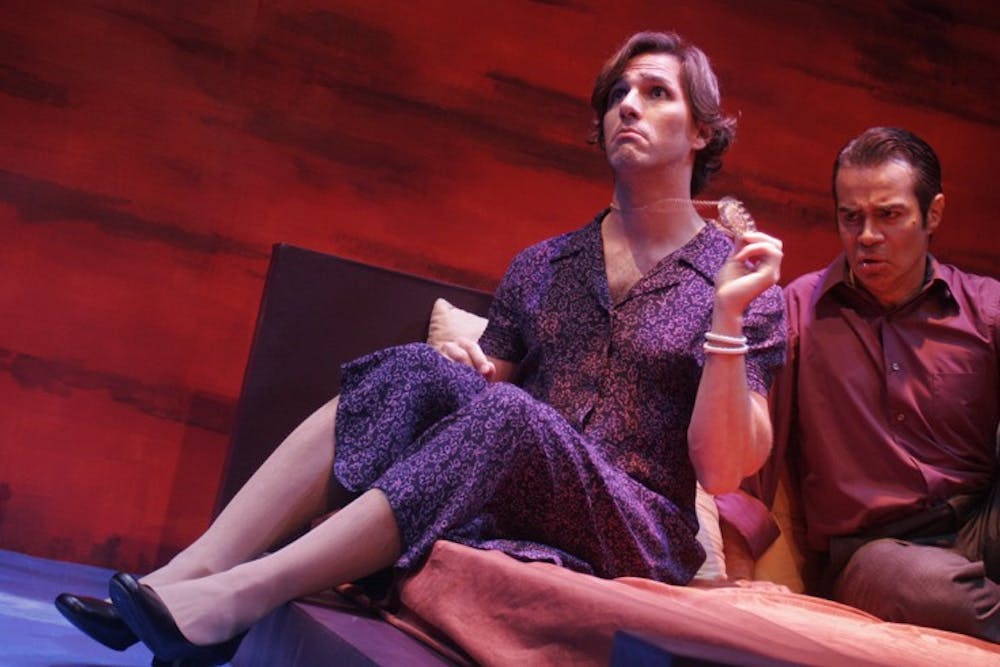The cover art for “Lúcido,” the latest staging at GALA Hispanic Theatre, depicts a man hovering in the clouds in high heels, trying to tug his brain down from the sky with a rope like a deflated balloon.
The program’s collage of symbols presents both the play’s emotional complexity and the dream-like nature of its narrative. Despite pushing the boundaries of traditional playwriting and staging, smart direction and fresh use of movement manage to engage the audience, instead of confusing them. Without the traditional markers of time and meaning, “Lúcido” brings emotional intensity and perspective to its familiar themes of love and betrayal.
“Lúcido” tells the story of Lucas, a young man undergoing therapy to sort through his emotional baggage and family history. At times amusing and at other times incredibly sad, Lucas’ emotional struggle assumes context and complexity as the play unfolds. His mom loves him unconditionally, but the intensity of her love is the source of both his comfort and anguish. Woven into Lucas’ emotional journey is the return of his estranged sister, Lucrecia.
Rafael Spregelburd, the contemporary Argentinean playwright of “Lúcido,” is known for his unconventional use of language to explore the nuances of emotion. In a GALA play, language is always important: the bilingual nature of its productions asserts the active role language plays in shaping understanding and perspective. In “Lúcido” in particular, Spregelburd uses the poetics of his language to convey the emotional oscillation of his characters. Amid powerful acting and directing, the play’s drama and power reach back to the structure of its sentences.
Spregelburd repeats strings of words and conversations, giving new context each time. The dialogue often feels like a Philip Glass song, with language progressing and acquiring new meaning, all the while revolving around the same pattern.
For example, the play opens with a dinner scene at a restaurant. It is Lucas’ birthday, and he goes with his mom and sister to a trendy restaurant that makes you cook your own dinner at the table. The scene is banal but funny, akin to a scene from a sitcom. As the play progresses, scenes of reality collapse into dream sequences; the effect is a blurring of the distinction between the worlds of Lucas’ troubled imagination and reality.
Spregelburd thus returns again and again to this same dinner scene. Each time, the scene’s framework is a little different, a little bit more distorted and dark as new betrayals and scars emerge.
Set amid a blue background with hasty whirls of white paint suggesting clouds, scenes of “Lúcido” often feel like a surrealist painting. Similar to the depiction of Lucas on the program’s front cover, these characters are literally trapped within the clouds of their own minds.
Unlike a surrealist painting, however, theater can use movement to convey narrative and humanity. The characters in “Lúcido” thus use the entire stage in fits of movement, giving physicality to the play’s exploration of psychology. Often, the drama on stage feels like an acted-out scene in Lucas’ mind.
José Carrasquillo, the director of “Lúcido,” never lets the play’s experiment with language and form become its point. Indeed, wrestling with conventions allows the play’s theme of familial betrayal to emerge with startling electricity. Jarred and a little bit confused, the audience grasps more intently at all that is human and grounding. The emotional struggles feel so personal because, through empathy, the audience finds footing and clarity.
According to the director’s notes, in Spregelburd’s home country of Argentina, some 70 percent of the population goes to therapy at least once at week. “Lúcido” departs from reality but remains topical and relevant. Blurring the imaginative and the expected, GALA’s insightful new production shows the cost of lucidity.
“Lúcido” runs through Oct. 11.
You can reach this staff writer at thescene@theeagleonline.com.





